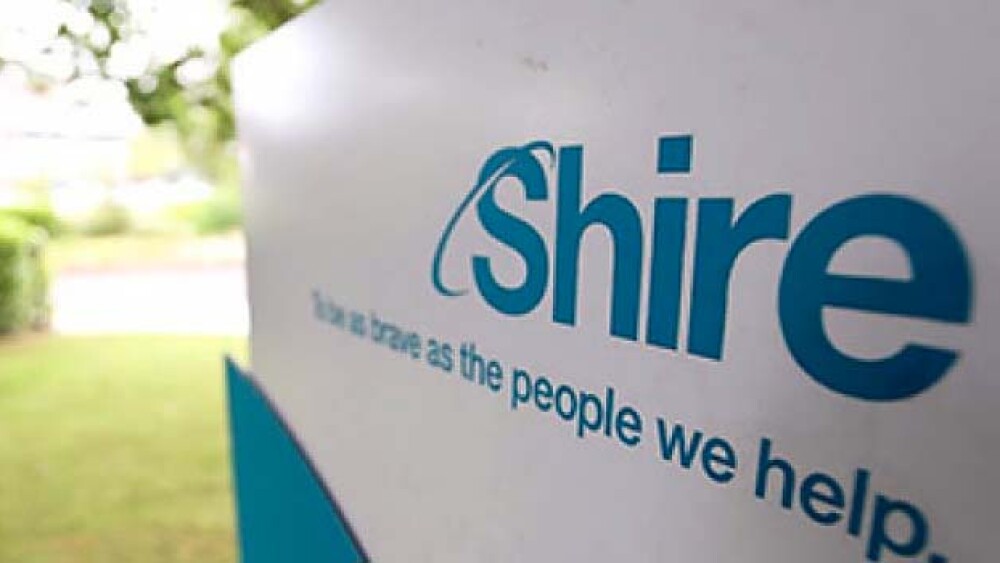Takeover whispers boosted long-standing target Shire to the top of the FTSE 100 as the pharma firm’s shares rallied on hopes of a mega deal bringing shareholders an early Christmas present.
Dublin, Ireland-based Shire‘s stock has been on the rise recently, pushed upward by rumors of a potential takeover. The rumors aren’t exactly new. They’ve been around since at least 2016. Shares, however, took a dip after recent bad news regarding its SHP609 for Hunter syndrome.
The Telegraph reported, “The City rumor mill talked up a bid again earlier this year and boss Flemming Ornskov has argued that its promising pipeline of drugs had not been factored into the firm’s declining share price. The acquisitive firm’s shares drifted to its lowest level in 15 months in November, pulling back as much as 31pc from its 2017 peak. Shire’s afternoon boost sent it to the top of the blue-chip index leaderboard with shares closing 143p, or 3.8pc, higher at 39.20 pounds.”
Shares had a high of $190 on May 18, 2017, dropped to $138.32 on Nov. 13, and rose to a recent high on Dec. 19 of $158.72, before dropping to its current share price of $155.80.
The price drop was likely related to the announcement of the SHP609 trial. The drug, previously known as HGT-2310, is a formulation of idursulfase for pediatric cases of Hunter syndrome (mucopolysaccharidosis II or MPS II) and cognitive impairment. The trial failed to meet its primary or key secondary endpoints. The primary endpoint was the difference in cognition between patients receiving SHP609 and a control group. The measurement was change from baseline in General Conceptual Ability (GCA) in children with Hunter syndrome after 12 months of treatment. The key secondary endpoint was the difference between the two groups measured by changes in Adaptive Behavior Composite (ABC) score.
“Hunter syndrome is a severely debilitating rare genetic disorder caused by an enzyme deficiency which typically presents in early childhood,” said Joseph Muenzer, professor of Pediatric Genetics and Metabolism Genetics at the University of North Carolina Chapel Hill School of Medicine, in a statement. “Two out of three patients exhibit progressive cognitive decline which is a high unmet need. This can be devastating for patients and their families as it severely diminishes a child’s functional ability and typically leads to death in the teenager years.”
Shire is also battling it out in court with Roche over patents for Roche’s new hemophilia drug Hemlibra. Shire recently filed a new motion in U.S. court to halt the sale of the drug. Shire’s lawsuit alleges that Roche infringed on a key patent to develop the drug, which was approved in November by the U.S. Food and Drug Administration (FDA).
Roche’s price tag for Hemlibra is about $450,000 pear year, with annual sales expected of about $5 billion. A ruling is expected sometime in 2018.
At the recent American Society of Hematology (ASH) meeting, Shire’s Ornskov said in an interview, “I don’t think factor VIII, I don’t think factor IX, I don’t think plasma, I don’t think Feiba is going to go away with any of the things I see here,” referring to older hemophilia treatments. They “will still be part of the treatment options for patients, and in many cases, the foundation of their treatment.”
Which apparently didn’t mean they won’t take Roche to court over a competitive threat. Shire is a powerhouse in hemophilia after it acquired Baxalta, but it’s lagging behind in gene therapy and bispecific antibodies. Since that acquisition, Ornskov said, it has thrown resources into “all the things that we can do in gene therapy. I think we’ve shown in multiple categories that we can catch up and sometimes overtake some of our competitors.”





